AI, writing, writers, and their livelihoods
The tsunami of synthetic writing is upon us, flooding the online world and threatening to bury our hand-crafted writing. Join me below to learn what Substack writers think of this brave new world.
AI, friend or foe?
Artificial Intelligence is quite a divisive subject. In this article I start to unravel some of the hopes, fears, and ideas we might entertain about this technology as it slowly begins to encroach upon our worlds, on our writings, on our livelihoods, and ultimately on our minds.
The AI systems are here to stay, of that we can be sure. However, as in many scientific domains today, the public discourse on this topic is often shrouded in confusion, misinformation, and much hype. Even the language used to describe AI is frequently problematic, often imputing powers onto machines that they simply do not possess. It is not only the AI systems that are “hallucinating”. We also hallucinate back on them. Anthropomorphizing the machines only distorts the conversation.
The modern era
The modern era is of course marked by the rise of machines. Across much of our human history we were kept busy staving off hunger, either scavenging for food, or engaging in labor intensive agricultural work of some kind. As machines emerged, they began to replace both manual and skilled labor in many sectors of the economy. Changes brought on by the adoption of machines were not always greeted favorably. There are many instances when workers rallied, united in protest.
The weavers and lacemakers
In the early 1800s in Central and Northern England, groups of skilled textile workers famously rebelled against the industrialists who were starting to mechanize their trade and produce cheap knock-offs of their work. Workers complained that the industrialists were using machines in "a fraudulent and deceitful manner" to produce inferior goods they could not compete with. The Luddites, as they collectively became known, started to organize and perform raids on factories where they destroyed the machines that threatened their livelihoods. The Luddite’s attempt to quell this technology was short lived and ultimately unsuccessful. The emerging capitalist class prevailed using a combination of brute force and legal measures to squash all opposition. The machines won.
The wordsmiths
As the modern era progressed, the intellectual class, the wordsmiths, mostly benefited from the innovations it delivered. The printing press. The typewriter. The personal computer. Word processors and spell checkers. The internet and email. The electronic book. Social media. Tools such as these often only enhanced a writer’s life and allowed many to nurture an audience and create a vocation from their intellectual labor.
The rise of AI
The first wave of the AI revolution is truly upon us. It was only last month that Google Search changed its policy on AI content, confirming the fears of many who had noticed that Search results were awash with synthetic content. Writers may for the first time find themselves competing directly with AI generated writing in the marketplace for attention. In an almost comical attempt to limit this onslaught, Amazon’s publishing business has put a limit of three books a day that can be uploaded to their platform. Mark Zuckerberg only two weeks ago announced the mass rollout of generative AI tools on his Social Media platforms. This simple pronouncement by a tech CEO brings these powerful tools to the masses.
You can understand why some writers may be voicing concerns. If you are unnerved, excited, or confused by emerging technologies as they inevitably start to impact our lives, please consider subscribing to this newsletter. I will provide deep analysis to unravel the complexities we face when encountering such technologies and empower you both to join the conversation and make informed choices.
Half-full or half-empty?
On the one hand, we have the tech optimists, happy to ride the wave of innovation and rush to implement, optimize, and exploit any new tech. Many people are drawn to heroic figures. The tech CEOs seem eager to adopt such roles. Armed with a flourish of hubris and hyperbole they gather crowds of followers and evangelists behind them. Whilst many writers may be reticent to admit using AI tools, I know from my own reading of Substack pages that many of course do.
Many traditional creatives are understandably quite worried by these developments. Court cases have been filed. Is this the time to rise up and join the resistance and fight this technological assault? One thing is certain, maintaining apathy and ignorance on this important topic will not be a winning strategy.
A foregone conclusion?
If history is our guide, as we reflect on the trials and tribulations of the Luddites in 19th century England, we might conclude that writers and other creatives are today also fighting a losing battle. How could we the Lilliputian creatives realistically defeat the Tech Giants?
On the contrary, we might think that all this fear surrounding AI is simply misguided. Maybe AI generated content offers no existential threat to real writers at all. In fact, you could even argue that these AI tools give writers more opportunity to flourish. As thoughts such as these started to circulate in my mind, I decided to reach out on Substack to find out what other writers thought on this matter.
The AI bots
As I was getting to grips with Substack as a platform, I had discovered some evidence that AI systems were beginning to crawl through Substack pages and train their Large Language Models on the writing they were scraping. Surprised, I wondered if other authors in this space had thoughts on this uninvited intrusion. So, I nudged a few hundred writers on the platform and asked them to comment. This I believed would provide the perfect litmus test to check the waters of opinion.
What follows is a sample of the comments received that reflect a diverse range of opinions held on this contentious topic. Again, I must thank all those writers who responded. I hope this important conversation will grow as I share your valuable contributions. I have cropped a few of the comments and grouped them logically to stay on topic. The opinions offered cannot be quickly skimmed through like with some writing. They often demand pause and reflection to be penetrated fully.
The Substack writers respond
The naysayers
It should come as no surprise that some of the first responses I received expressed a clear negativity towards the idea that AI systems are starting to scrape our online writing.
was happy that I had shone a light on this topic:
A few other commenters didn’t seem fazed by the AI bots , as
reflected in a blasé manner:Some even saw the comedic side, like
:Remembering the human
A few writers highlighted the uniquely human attributes we bring to our writing.
commented:These appeals to our unique human qualities feel right to me. As a technologist though, I am still worried. This tech is still very much in its infancy. With thousands of developers busy working out possible applications for AI, the sheer speed and volume of these developments are becoming impossible to keep up with. We are not being shown the cutting edge versions of these large language models, and forming opinions based on what we can see today might be short-sighted. ChatGPT versions 7 or 8 might bring with them non-linear advances, further compounding the disrupting effects that this technology can bring to our lives. Something to keep in mind.
Legal matters
A number of commenters highlighted legal perspectives of AI.
brought up copyright:In my next article I will provide a deep dive into some of these legalistic arguments, a complex matter that deserves a more detailed consideration.
The tech curious
As
recently wrote, many of us are "simultaneously wary of the political and economic environments in which these systems are being developed and compelled by the potential of AI systems as creative tools." As both a techie and a writer I would include myself in this group.expressed some skepticism around the current crop of AI systems:
The corporations
The powerful tech companies currently pulling the strings for these AI systems were highlighted by a few writers.
commented on the techbros:What about Substack?
A few writers wanted to know what Substack itself thought about this issue and what they could do to protect their biggest asset, us, the writers.
had tried contacting them previously on this topic without success. tried to nudge the CEO for his thoughts, as didwho writes Life Litter.With all these comments in my inbox I felt an obligation to get answers. So I reached out to about a dozen people at Substack to seek a response. I was unsuccessful in my initial attempts. As I recounted in my previous post, it was only after relentlessly bugging Chris Best, the CEO of Substack, that he finally deigned to give me a brief online parley. He informed me that they are indeed planning to offer the ability for writers to block the AI bots. This will of course take some time to implement, but as writers we can rest assured that it is at least in the pipeline.
Whilst we are on the topic of Substack, I received a very interesting comment from
on a possible future path for writers:As the web is drowned out by synthetic writing perhaps the demand for quality writing will be met by secure platforms cut-off from AI systems. Platforms like Substack, where real writers can interact with human readers. Just as the 19th century industrialists didn’t totally kill off bespoke hand-made clothing, it simply turned it into a luxury product for the discerning dandies out there.
These ideas were echoed by
who seems to have found solace with an intimate audience on Substack:Let’s get philosophical
To bring the conversation to a close I nudged a few Substack philosophers on the topic of AI taking our writings. I was hoping to spark a final debate.
picked up the baton first:To respond to this point by Matthew, I might add that whilst individual writers may not make a lot of money ripping off your work using AI, we can rest assured the tech companies providing these tools most certainly will.
To conclude, an apt comment from
closes this debate:The polls are in
I added a poll to my original post to measure the sentiment around AI bots scraping our writing. When I created the poll, I assumed any reader could vote on it. It was only after I published it that I noticed that voting was limited to subscribers only, a few users even complained they were kicked off the article as they tried to vote (perhaps these bugs can be ironed out by the Substack team,
, any thoughts?). Consequently, only a small percentage of readers of the post cast a vote. The votes that were counted nonetheless provide a valuable sample and looked like this:I hope this commentary has proved as interesting to you all, as it was for me. Please comment below to add to this conversation or share this post with those who may be interested. The only way we can hope to effect change in the world, is if we manage to articulate our thoughts and feelings on important issues like these. To continue my exploration of how technology impacts our lives please consider subscribing below. As a new writer on this platform I would appreciate your support.
Legal battles, copyright, and the power of big tech
In my next article I will be doing a deep dive into the flurry of court cases emerging throughout the world as creatives start to fight back against big tech. I will examine what they are up against and what this means for writers and other creatives. Subscribe to keep informed. Thanks for reading and I’ll see you there!





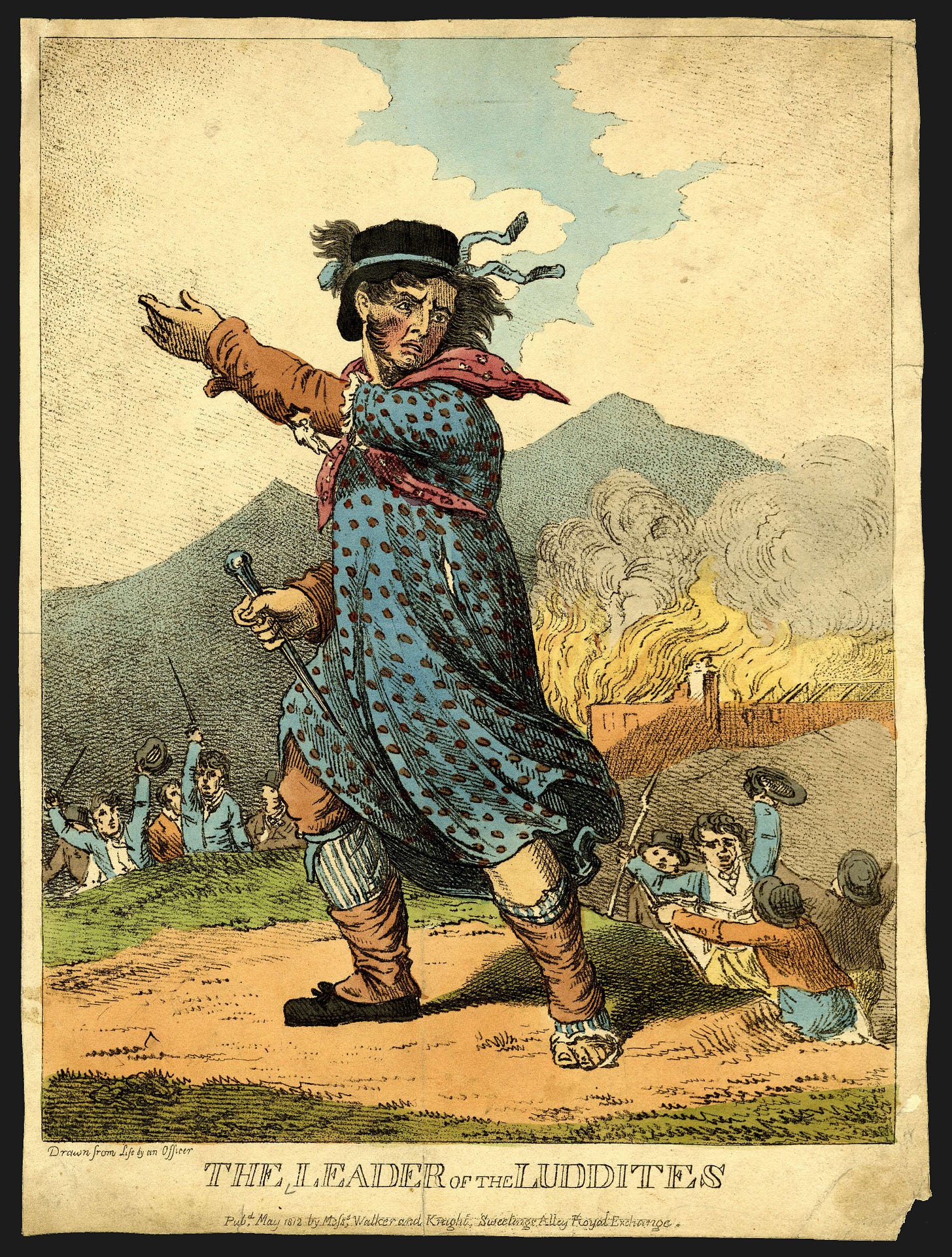


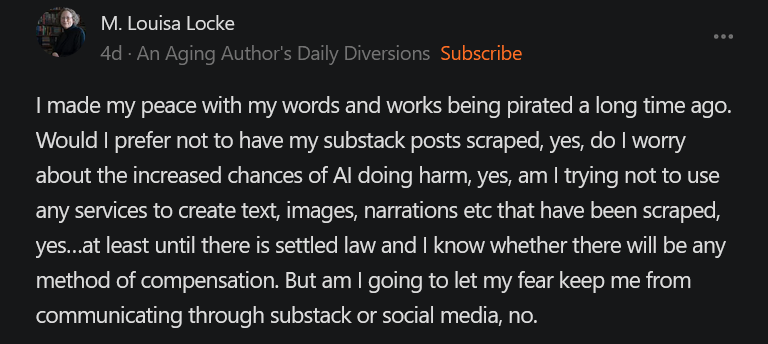
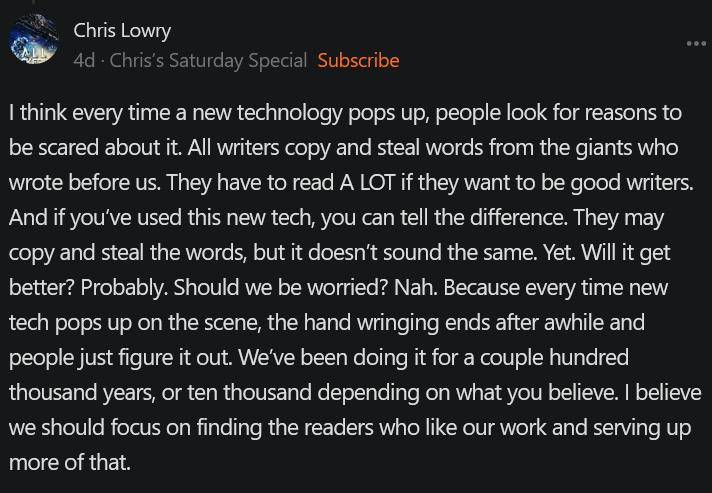



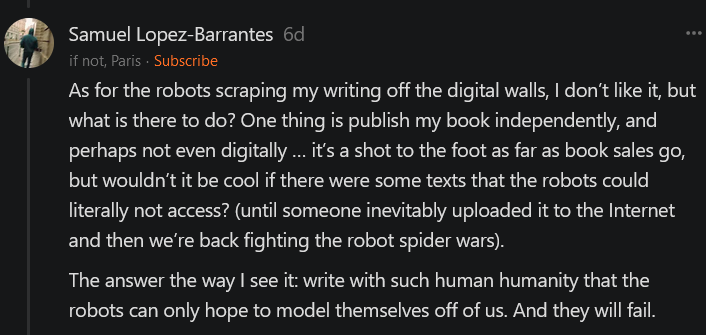


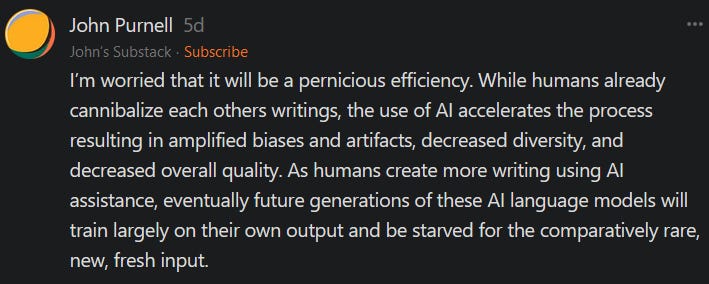
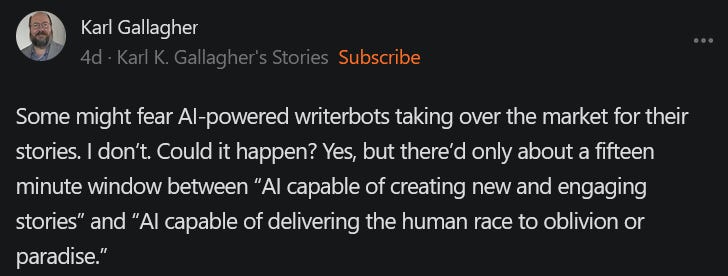












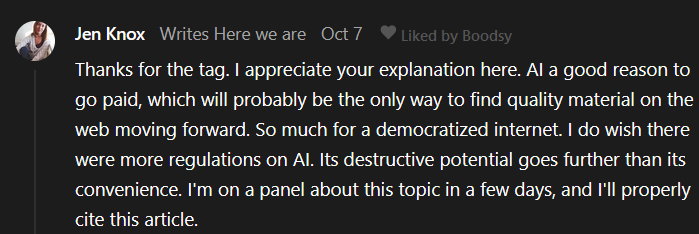






There is now a setting to block the AI bots from your Substack Pages. Go to your Dashboard, choose Settings and scroll down to publication details to find the option. It is called Block AI training
So much here! My fav comment was from Karl Gallagher. The time between AI creating new and engaging stories and it’s ability to send us to oblivion or paradise - 15 minutes!!
Boodsy, thank you for this deep dive!